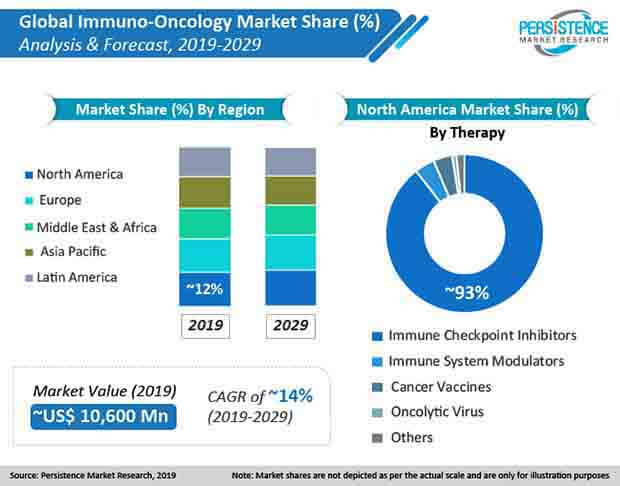Immuno-Oncology Market Segmented By Immune System Modulators, Cancer Vaccines, Oncolytic Virus, Immune Checkpoint Inhibitors Therapy Type in Melanoma, Lung Cancer, Blood Cancers, Renal Cell Carcinoma, Prostate Cancer, Bladder Cancer Therapeutic Area
Industry: Healthcare
Published Date: September-2019
Format: PPT*, PDF, EXCEL
Delivery Timelines: Contact Sales
Number of Pages: 168
Report ID: PMRREP11329
Cancer is considered to be the second-most leading cause of death globally after cardiovascular disease. The percentage of deaths due to cancer has increased from 12% in 1990 to 15% in 2018 around the world. As per the report of World Health Organization (WHO) published in 2018, 8.3 millions of deaths are caused by cancer each year, approximately 70% of new cancer cases are expected to be reported over next 20 years.
More than 60 percent of the world’s new cancer cases occur in Africa, Asia, and Central and South America & 70 percent of the world’s cancer deaths also occur in these regions. Each type of cancer requires unique immuno-oncology treatments.
Hence, increasing prevalence of cancer, and the need for personalized medicine are expected to increase the demand for immuno-oncology treatments. The rising number of cases of deaths related to cancer, and rising demand for effective and innovative immuno-oncology treatments by patients and healthcare professionals are likely to boost the growth of global immuno-oncology market.

Immuno-oncology therapy has been hailed as one of the most promising advancements for the treatment of cancer. Immuno-oncology therapy has given many research and medical communities a reason to be optimistic. Recent advancements in drug discovery and development underscore immuno-oncology therapy’s exciting potential for the future of cancer treatment.
The growing number of immuno-oncology treatments, which are in different phases of clinical trials, and the increasing approval of immuno-oncology therapies by FDA are leading to the acceptance of new and advanced technologies in the field of immuno-oncology therapy.
There is very high adoption of immuno-oncology therapies in Western countries, considering they have a largely well-tolerated adverse event profile compared with conventional chemotherapy. The increasing demand for innovative immuno-oncology therapies has thus led to the growth of the immuno-oncology market at a global level.
Biomarkers and pharmacogenomics have a wide application in identification of how well patient responses to immuno-oncology therapy-based treatments, so that the overall benefits of such treatments could be maximized. Considering that, various immune resistance mechanisms have been observed in certain patients. It is desirable to identify approaches so that candidates can derive maximum therapeutic benefits.
For instance, the expression of PD-L1 on tumor cells has been identified as a prognostic biomarker in patients with advanced lung cancer treated with pembrolizumab, a PD-1 checkpoint inhibitor. Various companies have therefore been involved in co-developing companion diagnostics and seeking regulatory approval for use along with these immuno-oncology therapies, thus leading the overall growth of the immuno-oncology market.
Manufacturers of immuno-oncology therapy-based treatments face a lot of complexity in the production and manufacturing processes. Thus, limited number of organizations are able to offer manufacturing solutions, which drug developers seek, in order to free up in-house capacity for clinical development material. Additionally, small biotech companies involved in this market rarely possess the infrastructure and capacity for commercial production.
Several contract manufacturing organizations (CMOs) are also investing in adding capabilities to manufacture complex immunotherapies, thus being able to offer solutions towards the latter part of the value chain. These factors are hampering the growth of the immuno-oncology market. Also, the high cost of the immuno-oncology therapy-based treatment is expected to limit the growth of the market in the near future.
A comprehensive view of the immuno-oncology market has led our analysts to conclude that, the market is growing at an impressive rate, with North America and Europe holding a large chunk of the global demand for immuno-oncology therapy. Increasing acceptance of immuno-oncology therapy-based treatments, especially in developed countries like the U.S, Mexico, and Germany is spurring the growth of the global immuno-oncology market.
Furthermore, the higher adoption of immuno-oncology therapies in Western countries, considering they have a largely well-tolerated adverse event profile compared with conventional chemotherapy is more likely to support the growth of the immuno-oncology market over the forecast period.
The immuno-oncology market is expected to have a robust growth in the forecast period in countries of the Asia Pacific region. This is attributed to the rising prevalence of cancers and increasing demand for immuno-oncology therapies over chemotherapy in the region.
Also, increasing demand for biomarkers-based immuno-oncology therapy is anticipated to create more opportunities for immuno-oncology market players. In addition, the growing awareness for early detection and treatment of cancers is fueling the growth of the immuno-oncology market. However, factors such as high drug pricing, development costs and limited technical expertise are projected to deter the growth of the immuno-oncology market over the forecast period.
PMR’s study on the immuno-oncology market offers information divided into four important segments-therapy type, therapeutic area, end user, and region. This report offers comprehensive data and information about the important market dynamics and growth parameters associated with these categories.
| Attribute | Details |
|---|---|
| Therapy Type |
|
| Therapeutic Area |
|
| End User |
|
| Region |
|
To know more about delivery timeline for this report Contact Sales
